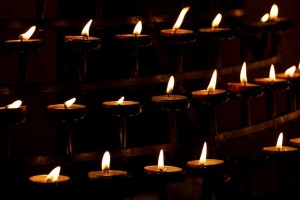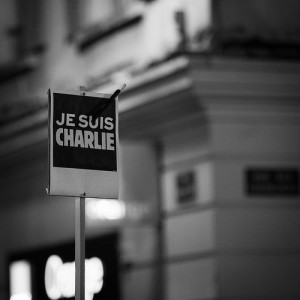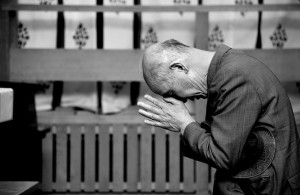 A soft golden light, emanating from the hanging, yellowish-gold sconces, illuminated most of the church. The apse was shallow, not extending back very far, it’s vaulted ceiling obscured by a thick, plain, wooden border. The apse was unlit and remained relatively untouched by the light, though the tabernacle was faintly visible in the darkness.
A soft golden light, emanating from the hanging, yellowish-gold sconces, illuminated most of the church. The apse was shallow, not extending back very far, it’s vaulted ceiling obscured by a thick, plain, wooden border. The apse was unlit and remained relatively untouched by the light, though the tabernacle was faintly visible in the darkness.
Bundled in a peacoat I sat in the back (so as not to share my cold with anyone). It was the vigil of the Baptism of our Lord. I had arrived early for confession, and being the only one present, enjoyed the quiet solitude of the church after my penance. After a time four elderly women ambled to the front of the church. “Let us begin the Holy Rosary of the Blessed Virgin Mary…” Enveloped in the golden light, staring into the darkness at the tabernacle, their old, frail voices repeated each “Ave” with a rhythmic, unfailing consistency.
Watching quietly from the back of the church I wondered to myself what unknown evils had been held at bay by the faithful adoration of these simple, old women of Waco, Texas.
An elderly couple sitting directly behind me knelt to pray in  preparation for the liturgy, the wife’s mouth just behind my ear, whispering over the raised lapel of my peacot. She softly uttered prayers, the words of which were mostly inaudible, except for the phrase, “…for us sinners.” She repeated this phrase a few more times during her preparation—“…for us sinners.”
preparation for the liturgy, the wife’s mouth just behind my ear, whispering over the raised lapel of my peacot. She softly uttered prayers, the words of which were mostly inaudible, except for the phrase, “…for us sinners.” She repeated this phrase a few more times during her preparation—“…for us sinners.”
On a hill in Montmartre, watching over the city of Paris, sits Sacré-Cœur Basilica —the Sacred Heart Basilica. In the wake of the terrorist tragedies in Paris, I could not help but think of this beautiful basilica nesting over Paris, where perpetual adoration has been occurring since 1885. For 130 years Catholics have ceaselessly adored and petitioned Christ in that place. While Cherif and Said Kouachi and Amedy Coulibaly terrorized Paris, Christ was there on the hill overlooking the city. I found myself wondering what unknown evils had been held at bay by the endless and ceaseless prayers to Christ on the hill of Montmartre.
 I do not claim to know why evils like the incident at Charlie Hebdo occur. There are certainly psychological and sociological theories of terrorism. The psychosocial picture, however, is complex. While various individual factors that may dispose one to terrorism, there are quite often also social, political, and financial factors that contribute to the radicalization of an individual to terrorist acts. As such, a psychological profile for a terrorist is difficult to concretize. Terrorist can be political, criminal, or psychopathological depending on the motivations and goals of their actions. According to Dr. Jerrold Post, a psychiatrist who has studied terrorism for years, religious fundamentalism emerges as a particular subdivision of political terrorism. These are individuals who, using their religion as a justification and motivation, kill in the name of God.
I do not claim to know why evils like the incident at Charlie Hebdo occur. There are certainly psychological and sociological theories of terrorism. The psychosocial picture, however, is complex. While various individual factors that may dispose one to terrorism, there are quite often also social, political, and financial factors that contribute to the radicalization of an individual to terrorist acts. As such, a psychological profile for a terrorist is difficult to concretize. Terrorist can be political, criminal, or psychopathological depending on the motivations and goals of their actions. According to Dr. Jerrold Post, a psychiatrist who has studied terrorism for years, religious fundamentalism emerges as a particular subdivision of political terrorism. These are individuals who, using their religion as a justification and motivation, kill in the name of God.
Distinct from religion as a justification and motivation for terrorism, however, there are also theological underpinnings for terrorism. That is, there are certain theological positions that seem to make faith more malleable to terrorist ends. Pope emeritus Benedict XVI accurately diagnosed one of these reasons in his Regensburg lecture:
“God’s transcendence and otherness are so exalted that our reason, our sense of the true and good, are no longer an authentic mirror of God, whose deepest possibilities remain eternally unattainable and hidden behind his actual decisions.”
When God’s transcendence is vaulted to such an extent that reason cannot speak meaningfully of the goodness and truth of God’s nature, then God can be a tyrant, unbound from the restrains of truth and goodness, handing down and commanding actions which contradict His very essence. In this view all we know of God is the voluntas ordinata—His ordained will—what we see of His actions and creation. Accordingly, since reason cannot grasp or know anything of Him beyond His ordained will, God has the utter freedom to pass down commands that seem abhorrent and contrary to reason—commands which reason must follow blindly.
The Catholic Church teaches, however, that a real analogy exists between the transcendent and uncreated God and the created reason. While there is always a greater unlikeness than likeness, human reason’s apprehension of truth and goodness is still a genuine mirror of the truth and goodness of God. When we say, “God is good,” we really have some idea of what this means and are able to discern by reason what is contrary to God’s goodness. Thus, placing God in a radically transcendent and distant realm, such that reason’s ability to know or speak of Him is impossible (due to the destruction of the real analogy that exists) does not make God more divine; it simply makes Him more likely to be manipulated and molded into the justification for irrational human acts. For Catholics God is the Logos—order and reason—a Word that can be touched, tasted, and known. Thus, God does not and cannot act contrary to reason because He is the Logos!
The four old women rattling “Ave’s” in front of the tabernacle of the quiet southern church and the countless adorers kneeling before the monstrance in Sacré-Cœur all approach the One who is simultaneously transcendent and immanent. He is both God and man. His ways are high above our ways, yet He desires to be known and reveals Himself—first as “I AM” and then in the incarnation of the Word. He is Truth and Goodness, concepts about which our reason possesses real knowledge. He is Love and He has suffered in His flesh with and for those of us still walking in this valley of tears. We do not need to reach into the heavens and drag God to earth, molding Him to our end because we have a God who meets us in the flesh and elevates us up to His!
May there be mercy, refreshment, light, and peace for all those who were slain in Paris this past week. May the perpetrators of the attack finally know Him as He really is. As “for us sinners,” may we all spend more time kneeling before the knowable God—the Logos—and through the transformation of our own hearts and our prayers continue to hold at bay evils unknown.
“We do not need to reach into the heavens and drag God to earth, molding Him to our end because we have a God who meets us in the flesh and elevates us up to His!”
Love it!